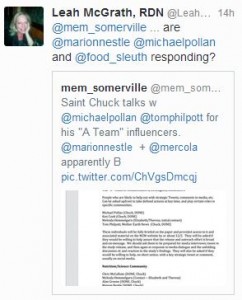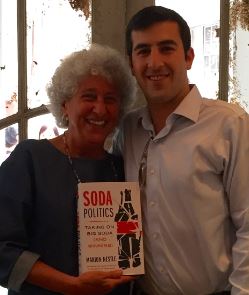Should scientists with financial ties to Monsanto be subject to FOIA requests?
Sunday’s New York Times story on academic conflicts of interest focused on scientists with financial ties to Monsanto. The ties were revealed by open-records requests for e-mails and other information.
The Times was not the only one to make these requests. U.S. Right to Know, a group devoted to investigating Big Food and its front groups had already done so. U.S. Right to Know is funded primarily by the Organic Consumers Association, a national grassroots network advocating for organics, sustainability, and food safety—but against GMOs.
U.S. Right to Know rightfully takes credit for establishing the basis of the Times’ story. It sent open-records requests to scientists working for public institutions who seemed likely to have financial ties to Monsanto. Bingo. Some of the e-mails revealed such ties.*
But should government-funded scientists be subjected to open records requests? Couldn’t these requests amount to open season on academics—a modern-day version of witchhunts? This question is now under active debate (and see comments on my previous post).
While these debates are raging, here is one aspect of this story that the New York Times did not tell.
Earlier this month, Paul Thacker and my NYU colleague Charles Seife, wrote a piece for PLoS [Public Library of Science] Blogs arguing that Freedom of Information Act (FOIA) requests “for personal correspondence are not just appropriate, but crucial to ensuring transparency.” They argue that the benefits of transparency outweigh the costs.
But transparency laws remain a fundamental tool for monitoring possible scientific misbehavior. And it would be a mistake to believe that scientists should not be subject to a high level of outside scrutiny. So long as scientists receive government money, they are subject to government oversight; so long as their work affects the public, journalists and other watchdogs are simply doing their jobs when they seek out possible misconduct and questionable practices that could threaten the public interest.
Thacker and Seife explain:
Last week, Nature reported that the University of Florida had provided them with emails that U.S. Right to Know had FOIA’d on one of their researchers…the [Nature] story noted that the researcher has received money from Monsanto to fund expenses incurred while giving educational talks on GMOs. The article also noted that the PR Firm Ketchum had provided the scientist with canned answers to respond to GMO critics, although it is unclear if he used them [the Times story says he did but now regrets it].
The article does not report that the scientist has repeatedly denied having a financial relationship with Monsanto. The article also does not report on an email titled “CONFIDENTIAL: Coalition Update” from the researcher to Monsanto in which the scientist advised Monsanto on ways to defeat a political campaign in California to require labeling of GMO products.
Some readers of PLoS were outraged that this online journal would publish an article supporting open-records requests of scientists (see, for example, this from the American Council on Science and Health).
Here’s where things get interesting.
PLoS responded to the criticism by, of all things, retracting the article.
Seife and Thacker explained their views in an op-ed in the Los Angeles Times.
If the public pays your salary, citizens have the right — within limits — to see what you’re doing. That’s the principle at the core of the federal Freedom of Information Act and of the many similar state freedom of information laws… “snooping” on scientists’ inboxes by journalists, watchdogs and government officials has revealed significant problems that would never have come to light via other means.
That, of course, is the basis of the New York Times’ exposé of Monsanto’s funding of scientists to testify on the company’s behalf to reporters, Congress, and the public.
Bottom line: Because industry-funded science and scientists almost invariably provide data and testimony that favors the sponsors interests, the press and public need to know about sponsorship.
One more comment: A substantial body of literature exists on industry sponsorship of science, particularly on the effects of pharmaceutical industry funding of medical professionals. Conflicts-of-interest researchers conclude that such conflicts are generally unconscious, unintentional, and unrecognized by participants. The remedy is increased government spending for research, an unlikely possibility these days. This means journalists will be kept busy exposing the many problems that arise when scientists take industry funding.
*The documents collected by the New York Times
Additions:
- Note: My previous post on organic-industry funding gives the link to the e-mails for Charles Benbrook
- Jonathan Latham provides further details on GMO public relations efforts




